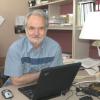Speakers
 |
Pia Ostergaard |
 |
John Parkinson |
 |
Maya SalehDr. Maya Saleh obtained her Ph. D. in 2001 from the department of Biochemistry at McGill University studying mechanisms of transcriptional regulation. In 2002, Dr. Saleh joined Merck Research Laboratories and in 2004 moved to the La Jolla Institute for Allergy and Immunology in San Diego California where she investigated mechanisms of apoptosis and innate immunity in host defense. Dr. Saleh joined the Faculty of Medicine at McGill University in 2005 and is currently Associate Professor in the Departments of Medicine and Biochemistry and Director of the Inflammation and Cancer Program. Dr. Saleh’s team is currently focused on the role of innate immunity in inflammatory bowel disease and cancer. They are specifically interested in the role of the crosstalk between the innate immune system and the microbiota in intestinal homeostasis, immune tolerance, chronic inflammatory diseases and cancer. |
 |
Carmen SapienzaCarmen Sapienza is Professor of Pathology and Laboratory Medicine and Associate Director of the Fels Institute for Cancer Research and Molecular Biology at Temple University Medical School. Dr. Sapienza received a B.A. in Biology from the University of California, San Diego, an M.S. in Oceanography from the University of Maine and a Ph.D. in Biochemistry from Dalhousie University in Halifax, Canada. He completed a Jane Coffin Childs postdoctoral fellowship at the Howard Hughes Medical Institute in Salt Lake City. His laboratory was among the first to discover DNA methylation differences between maternally and paternally inherited genes and parental-origin effects in pediatric cancer. Current research interests are in the evolution of maternal/paternal genome marking and gene-environment interaction in human disease. Research in Dr. Sapienza’s laboratory is supported by grants from the National Institutes of Health. |
 |
Stephen SchererDr. Scherer holds the GlaxoSmithKline-CIHR Endowed Chair in Genome Sciences at The Hospital for Sick Children and University of Toronto. He has made numerous contributions to medical genetics including mapping sequencing and disease gene studies of human chromosome 7. In 2004, his team co-discovered global gene copy number variation (CNV) and has since shown that CNV is the most abundant type of nucleotide variation of human DNA. His group then identified CNV to contribute to the etiology of autism and many other disorders, and the Database of Genomic Variants he founded facilitates hundreds of thousands of clinical diagnoses each year. His work is documented in >300 publications and patents cited more than 20,000 times. Dr. Scherer has won numerous honors such as the 2004 Steacie Prize, an International Howard Hughes Medical Institute Scholarship, and the 2008 Premier’s Summit Award for Medical Research. Dr. Scherer is a Canadian representative on the HUGO Council. |
 |
Erwin SchurrErwin Schurr obtained his Ph.D. from the Institute of Biophysics and Radiation Biology at the Albert-Ludwigs University in Freiburg/Br, Germany. He then did his postdoctoral studies in molecular genetics with E. Skamene and P. Gros at McGill University. In 1991, he joined the McGill Centre for the Study of Host Resistance and the Faculty of Medicine at McGill as Assistant Professor. He is a James McGill Professor of Human Genetics and Medicine at McGill University, and a member of the Research Institute of the McGill University Health Centre. His main research interest is the identification of host genetic factors predisposing to tuberculosis and leprosy; research that is supported by both national and international funding agencies. He has published extensively on the identification of genetic host susceptibility factors in both leprosy and tuberculosis. He has established field sites in several endemic countries for genetic epidemiological studies of tuberculosis and leprosy and is involved in projects aiming to develop effective low cost tools for the control of both diseases. His current research focus is on the identification of the genetic variants that confer resistance to infection with Mycobacterium tuberculosis, and the use of genetic findings to instruct public health policy. |
 |
Sohrab ShahDr. Sohrab Shah is an Assistant Professor in the Depts of Pathology and Computer Science, University of British Columbia and is a Scientist at the BC Cancer Agency. He is a Micheal Smith Foundation for Health Research Career Investigator. Dr. Shah's work focuses on characterization of cancer genomes for determination of pathogenic driver mutations in cancer subtypes and measuring and quantifying tumour evolution. His work is in the field of computational cancer genomics and involves development of statistical models and machine learning algorithms to interpret next generation sequence data for defining mutational landscapes and quantifying clonal evolution in ovarian and breast cancers. His recent work describing new cancer genes in ovarian cancer has been published in the New England Journal of Medicine and his work describing mutational evolution in breast cancer has been featured in Nature. |
 |
Eamonn Sheridan |
 |
Michael Surette |
 |
Elizabeth Thompson |